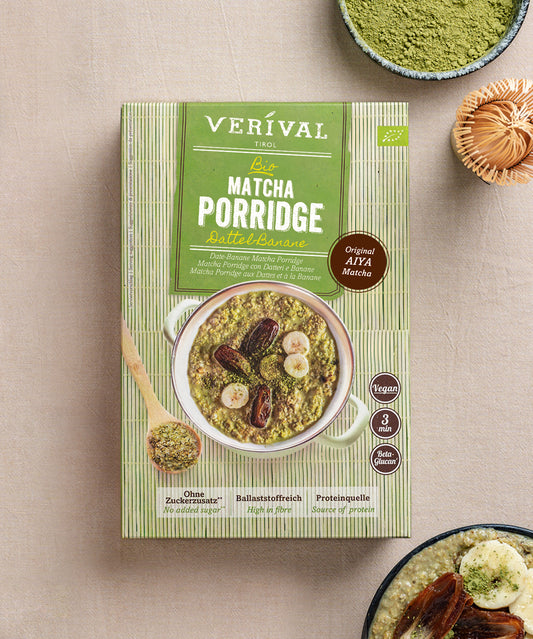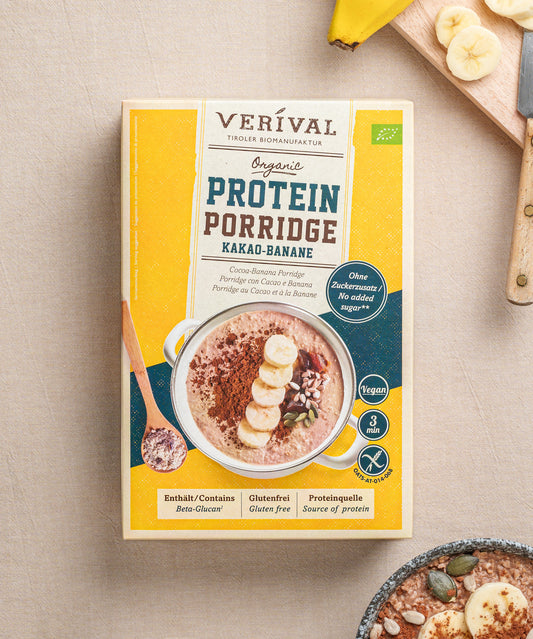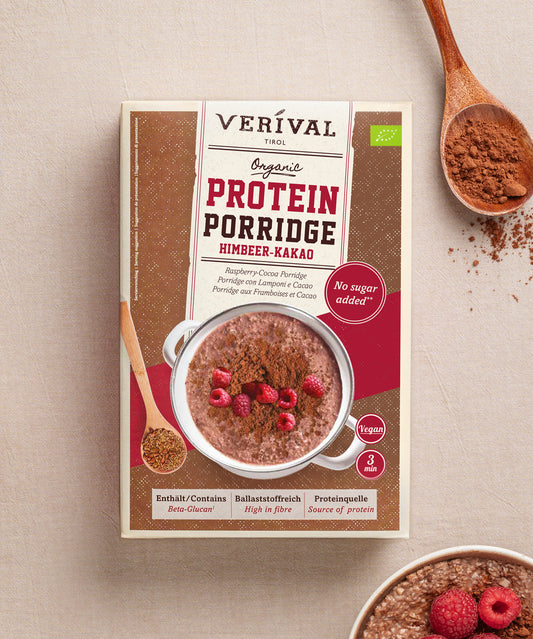After a long day, you look forward to a relaxing dinner. But as soon as you lie down in bed, the burning sensation behind your breastbone begins. Heartburn at night is not only unpleasant, it also robs you of sleep and disrupts regeneration. However, the problem can often be easily avoided – by eating the right foods at the right time. In this article, you will learn how heartburn develops, why it is particularly bad at night and which foods can help you sleep peacefully. With simple tips and specific dinner ideas, you can get your symptoms under control – without medication.
Discover our healthy Verival snacks here!
What is heartburn?
Heartburn is a burning, unpleasant sensation behind the breastbone, often accompanied by acid reflux or pressure in the upper abdomen. Many people experience it occasionally, others regularly – especially after eating or when lying down. To combat it effectively, you first need to understand exactly what is happening in your body.
Typical symptoms that you should take seriously
The main symptom is a burning sensation in the upper chest that can extend to the throat. It often feels as if something is ‘rising’. Some people complain of a sour taste in the mouth, others of a lump in the throat or a dry cough. Hoarseness or constant throat clearing can also be signs of reflux, especially if they occur in the morning after waking up.
Reflux: The actual cause behind the burning sensation
Heartburn is usually caused by stomach acid flowing back into the oesophagus – medically known as ‘gastroesophageal reflux’. Normally, a sphincter muscle at the entrance to the stomach prevents this reflux. However, if it does not close properly, the aggressive stomach acid rises upwards. The oesophagus is not designed for this – it reacts with irritation, inflammation and the typical burning sensation. The symptoms often worsen significantly at night, especially when lying down.
How exactly does heartburn develop?
Heartburn is not a coincidence. It is caused by a combination of diet, digestion, posture and physical factors. To avoid it, you need to understand how it develops – and regain control.
When the sphincter muscle fails
Between the oesophagus and the stomach is a small ring of muscle called the lower oesophageal sphincter. Its job is to seal off the stomach once food has arrived. If this muscle is weakened or under pressure, it no longer closes properly, allowing stomach acid to flow back into the oesophagus. There are many causes for this: being overweight, eating large meals, certain medications, stress or simply poor eating habits.
Acid production and stomach contents also play a role
The contents of your stomach also play a role. If you eat very fatty, acidic or late meals, your stomach produces more acid. At the same time, it takes longer to process the food, which increases the pressure in the stomach. This pressure in turn promotes reflux. This is particularly problematic in the evening because your body goes into rest mode. Digestion slows down, the entrance to the stomach is more vulnerable – and this is exactly what leads to night-time heartburn.
Why heartburn is worse at night
Many people experience heartburn particularly intensely at night. You may not have any symptoms during the day, but as soon as you lie down, the burning starts. There are clear physical reasons for this, which you should be aware of if you want to get the problem under control.
Gravity is absent when lying down
When sitting or standing, gravity helps keep the contents of your stomach where they belong – in your stomach. But as soon as you lie down, this natural protective mechanism is absent. Stomach acid can flow back into the oesophagus much more easily, especially if the sphincter muscle does not close completely.
This happens unnoticed in many people – they only notice it when the burning sensation or coughing wakes them up at night.
Digestion slows down in the evening
Your digestive system slows down in the evening – just like the rest of your body. If you eat late or choose heavy foods, your stomach needs significantly longer to process the food. The stomach acid remains in play for longer, the stomach stays fuller, and pressure increases – ideal conditions for night-time reflux. It becomes particularly critical if you lie down immediately after eating or go to bed on a full stomach. The result: irritation, poor sleep, inflammation – all unnecessary if you change a few habits.
What to look out for at dinner
Your evening meal plays a key role in determining whether you sleep peacefully or are woken up by heartburn during the night. It's not just the food that matters, but also the amount, timing and preparation.
Light but nutritious – that's what your evening meal should look like
Opt for easily digestible foods. Your stomach should not have to work hard in the evening. Steamed vegetables, boiled potatoes, rice, lean protein (e.g. chicken, fish or tofu) and mild grains such as oats or millet are ideal. Avoid anything that is high in fat, sugar or spice – these irritate the stomach lining and prolong digestion unnecessarily.
Eat slowly, chew thoroughly and make sure you eat moderate portions. Your stomach should not be overfilled when you go to bed. A stomach that is too full increases the pressure on the sphincter muscle – and that is definitely something you want to avoid in the evening.
Timing is crucial
Plan your evening meal at least two to three hours before going to bed. This gives your stomach enough time to process most of the food before you lie down. The later you eat, the higher the likelihood of stomach acid reflux. If you absolutely have to eat late, then only eat something very light – e.g. a small bowl of porridge or a mild vegetable soup.
Verival muesli with no added sugar – try it now
These foods are easy to digest in the evening
Not everything that is healthy is good for your stomach in the evening. Especially if you suffer from reflux, it is important to eat foods that are soothing, non-irritating and easy on the stomach. Here is a selection of foods that you can eat in the evening without regret – and that will help you avoid heartburn.
1. Vegetables – cooked, not raw
Vegetables are always a great choice. However, raw vegetables are difficult to digest in the evening and can cause fermentation and pressure in the stomach. Better options are:
- Zucchini
- Fennel
- Carrots
- Broccoli
- Parsnips
- Spinach (cooked)
Steamed or lightly cooked, they provide vitamins and fibre without burdening your stomach.
2. Alkaline and low-acid foods
Focus on alkaline-forming foods. They help neutralise stomach acid and soothe the mucous membranes. Good examples:
- Oatmeal
- Potatoes (cooked or mashed)
- Rice
- Millet
- Mild bananas
- Avocado (in small amounts)
- Tofu
These foods provide complex carbohydrates and gentle protein – ideal for filling you up without stressing your stomach.
3. Stomach-friendly sources of protein
Animal protein is okay – but it should be low in fat. Good choices:
- Chicken breast (cooked, not fried)
- Steamed fish (e.g. cod or trout)
- Low-fat quark or cottage cheese (in moderation and only if well tolerated)
- Eggs – boiled, not fried
Or plant-based:
- Lentils (well cooked and in small amounts)
- Chickpeas (mashed or cooked)
- Silken tofu or tempeh
4. Drinks that don't irritate
Your evening drink counts too. Avoid carbonated drinks, alcohol and acidic juices. Instead, opt for:
- Herbal tea (e.g. chamomile, fennel, lemon balm)
- Lukewarm water with a dash of rice malt or oat drink
- Stomach-friendly plant-based milk (unsweetened and without additives)
These evening meals are particularly suitable
Do you need an evening meal that is easy on the stomach, fills you up and prevents reflux? Here are some specific meals that are easy to prepare – delicious, digestible and absolutely stomach-friendly.
1. Steamed vegetables with mashed potatoes
Ingredients:
- 2–3 floury potatoes
- Zucchini, carrots and fennel
- 1 teaspoon olive oil
- Oat milk or rice milk
- A little fresh chives or parsley
Preparation:
Boil the potatoes until soft and mash with a dash of oat milk. Steam the vegetables until soft but not mushy. Season with a little olive oil and fresh herbs. This combination is alkaline, high in fibre and ensures a pleasant feeling of fullness without acidity.
2. Millet and vegetable stir-fry with tofu
Ingredients:
- 80 g millet
- Broccoli, bell pepper (mild), carrots
- Natural tofu
- Turmeric, basil, a pinch of cumin
Preparation:
Rinse the millet thoroughly, then cook until soft. Gently cook the vegetables and diced tofu in a non-stick pan without browning. Mix everything with the millet and season with mild spices. This meal provides protein, complex carbohydrates and important micronutrients – without irritating the stomach.
3. Oatmeal soup with vegetables
Ingredients:
- 3 tablespoons of soft oatmeal
- 500 ml water or vegetable stock (low-salt)
- Finely diced carrots and fennel
- 1 tsp flaxseed oil (add after cooking)
Preparation:
Add the oatmeal to the boiling broth, add the vegetables and simmer for 10 minutes. Add the oil at the end. This soup warms, soothes and provides you with fibre – perfect for the evening.
Foods & habits to avoid in the evening
If you want to avoid heartburn, you not only need to know what is good for you, but also what can disrupt your sleep. Many people underestimate the effect of certain foods and habits in the evening.
These foods irritate your stomach
Some classic foods are almost guaranteed to cause night-time reflux – especially when lying down. Be sure to avoid the following in the evening:
- Fatty foods (e.g. pizza, cheese, sausage, fried foods)
- Hot spices (chilli, pepper, curry)
- Tomatoes & tomato sauces
- Onions & garlic (raw or strongly fried)
- Citrus fruits and acidic juices
- Chocolate
- Coffee, black tea, alcohol
These foods promote acid production, slow down digestion or irritate the sphincter muscle – all of which are unfavourable before bedtime.
Habits you should break
It's not just what you eat, but also how you behave. Common mistakes:
- Eating late: If you eat at 9 p.m. and go to bed at 10 p.m., you're not giving your stomach a chance.
- Lying down after eating: Even just ‘lying down on the sofa for a bit’ can be enough to trigger reflux.
- Tight clothing: A tight waistband increases pressure on the stomach.
- Stress while eating: Eating quickly while watching TV or using your mobile phone – your stomach notices.
Plan to eat earlier and in a more relaxed manner, wear comfortable clothing and remain upright for 30–60 minutes after eating. This will give your digestive system the best chance to work properly.
Oatmeal for dinner if you suffer from heartburn
Oatmeal isn't just a power breakfast – it also makes an excellent light, soothing dinner. If you struggle with heartburn in the evenings, oats are a great way to whip up a stomach-friendly, filling meal that will help you relax and fall asleep.
Why oatmeal is ideal in the evening
Oatmeal is alkalising, rich in soluble fibre and easy to digest. It swells in the stomach, binds excess stomach acid and promotes gentle digestion. Unlike bread or raw vegetables, it does not burden the stomach and even has a soothing effect on irritated mucous membranes thanks to its mucus-forming properties.
They also keep you feeling full for a long time without weighing you down – ideal if you need something in the evening that gives you energy but doesn't cause reflux symptoms.
Simple recipe idea for the evening: Hearty oat porridge
Ingredients:
- 5 tablespoons of soft oat flakes
- 200 ml of oat drink or water
- 1 small carrot, finely grated
- A little courgette or fennel, finely diced
- A pinch of turmeric and some fresh parsley
Preparation
Cook the oats with the vegetables and liquid over a low heat for 5–10 minutes. Stir regularly until a creamy consistency is achieved. Season mildly at the end – no pepper or salt is needed. This dinner will calm your stomach, warm you from the inside and help you get through the night without heartburn.
Discover and celebrate the whole Verival breakfast range here!
Conclusion: Sleep soundly thanks to a smart evening routine
Heartburn doesn't have to be part of your evening. If you know which foods calm your stomach and which ones are best to avoid, you can take targeted action – without medication.
Eat light, early and consciously. Focus on alkaline foods, gentle preparation and proven aids such as oatmeal. This will ensure a peaceful night, restful sleep and a relaxed stomach. Your dinner determines how well you sleep – so make it your strongest weapon against night-time heartburn.
























